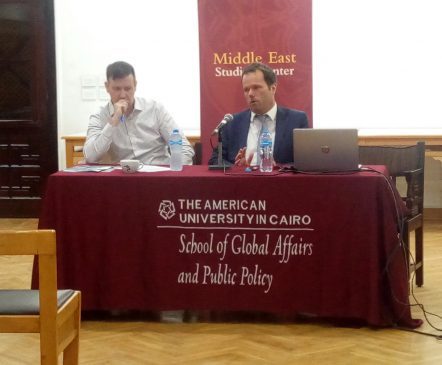
Food security is an important issue impacting local economies and societies in the Middle East and North Africa (MENA) region, and is likely to become more critical due to climate change.
Eckart Woertz, senior research fellow at the Barcelona Centre for International Affairs (CIDOB) and Riham Abu Ismail, World Food Programme (WFP) representative, hosted a lecture at Hill House Room in the Tahrir Campus on September 18, to discuss the challenges and setbacks that food insecurity causes.
According to Woertz, the MENA region does not produce much of its staples, relying heavily on importing necessities such as wheat, meat, and dairy.
This means that food securhity issues must be a priority for the region’s development strategies.
“The problem in the world with food security is not really a food shortage,” said Woertz, distinguishing between the two concepts which may often be confused.
Food accessibility is the core concern, he said.
“The official Food and Agriculture Organization (FAO) defines food security as food availability, accessibility and utilization. Food safety is part of food security,” said Woertz.
But political turmoil and war can directly endanger food safety and be used as weapons of influence.
A World Food Program (WFP) report says that after the January 2011 uprising, the Egyptian economy was on the verge of collapse and that this caused a major rise in food prices which affected an average of 74.7 percent of households.
The impact was more prominent in rural areas, the report said.
Woertz also pointed to the United Nations imposed sanctions against Iraq which impacted food security, led to the deaths of hundreds of thousands of people with no access to food and medicine and devastated in the country.
More recently, international organizations have accused the government of Syrian President Bashar Al Assad of halting food convoys to starve populations trapped in besieged cities.
In Egypt, there is concern about Ethiopia’s Great Dam and its effect on Nile water abundance downstream.
Woertz believes that the occurrence of conflict is unlikely, as water is a floating commodity.
He said that the impact of the dam on Egypt is still unclear. However, he argued that the dam might help in regulating the flow of water in the Nile river.
Chemistry Professor at Mohamed Farag believes that accessibility to technology is also a critical factor which impacts food security.
“If you pass by the Nile Delta and see the lands of the small local farmers, you will realize that they cannot afford to improve their facilities. The technology is available in Egypt but farmers are still farming using old techniques, due to the lack of knowledge and wealth,” he said.
The Research Institute for a Sustainable Environment (RISE) at AUC, in partnership with the International Center for Biosaline Agriculture (ICBA) in Dubai, launched the ‘Food for the Future’ program last year in a bid to boost food security in Egypt and the UAE.
Abu Ismail points to a WFP analysis using data from the Central Agency for Public Mobilization and Statistics (CAPMAS), citing that more than 16 percent of the Egyptian population did not meet their minimum daily energy intake in 2015. According to the same report, the minimum daily per capita in-take in Egypt is roughly 2,462 Kcal/ per person.
Abu Ismail believes that economic and political policies are key factors behind lack of food security and may even lead to obesity.
“It’s much cheaper to get the subsidized basket of rice, sugar, and oil because you can not afford to get the food that contains animal protein,” she argued.
In 2011, the UN announced that more than 13 million Egyptians suffered from food insecurity.